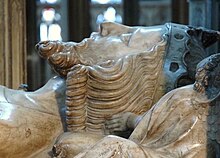Edward II of England
| Edward II | |
|---|---|

Effigy in Gloucester Cathedral
|
|
| King of England (more...) | |
| Reign | 7 July 1307 – 25 January 1327 |
| Coronation | 25 February 1308 |
| Predecessor | Edward I |
| Successor | Edward III |
| Born |
25 April 1284 Caernarfon Castle, Gwynedd, Wales |
| Died | 21 September 1327 (aged 43) Berkeley Castle, Gloucestershire |
| Burial | Gloucester Cathedral, Gloucestershire, England |
| Spouse | Isabella of France (m. 1308) |
| Issue Detail |
Edward III of England John of Eltham, Earl of Cornwall Joan, Queen of Scots Adam FitzRoy |
| House | Plantagenet |
| Father | Edward I of England |
| Mother | Eleanor of Castile |
Edward II (25 April 1284 – 21 September 1327), also called Edward of Caernarfon, was King of England from 1307 until he was deposed in January 1327. The fourth son of Edward I, Edward became the heir to the throne following the death of his older brother Alphonso. Beginning in 1300, Edward accompanied his father on campaigns to pacify Scotland, and in 1306 he was knighted in a grand ceremony at Westminster Abbey. Edward succeeded to the throne in 1307, following his father's death. In 1308, he married Isabella of France, the daughter of the powerful King Philip IV, as part of a long-running effort to resolve the tensions between the English and French crowns.
Edward had a close and controversial relationship with Piers Gaveston, who had joined his household in 1300. The precise nature of Edward and Gaveston's relationship is uncertain; they may have been friends, lovers or sworn brothers. Gaveston's arrogance and power as Edward's favourite provoked discontent both among the barons and the French royal family, and Edward was forced to exile him. On Gaveston's return, the barons pressured the King into agreeing to wide-ranging reforms called the Ordinances of 1311. The newly empowered barons banished Gaveston, to which Edward responded by revoking the reforms and recalling his favourite. Led by Edward's cousin, the Earl of Lancaster, a group of the barons seized and executed Gaveston in 1312, beginning several years of armed confrontation. English forces were pushed back in Scotland, where Edward was decisively defeated by Robert the Bruce at the Battle of Bannockburn in 1314. Widespread famine followed, and criticism of the King's reign mounted.
...
Wikipedia
